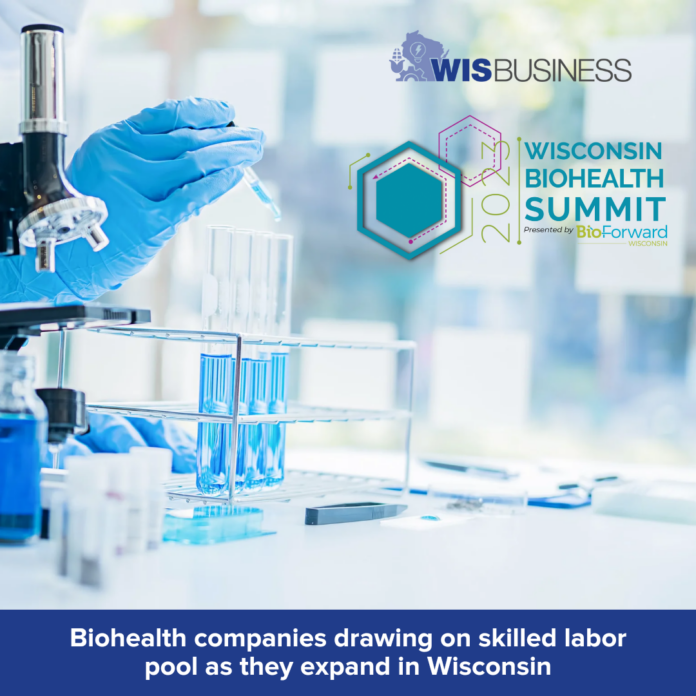
Biohealth companies in south central Wisconsin are drawing on the region’s growing pool of skilled talent as they expand.
Speaking yesterday during the Wisconsin Biohealth Summit hosted by BioForward Wisconsin in Madison, panelists acknowledged the workforce challenges facing most industries in Wisconsin. But they said the influence of UW-Madison and established industry leaders in the region has helped them surmount this obstacle.
“Madison is a really unique place,” said Lori Aschenbrenner, director of drug development and regional strategy for Labcorp, which has a flagship campus in the city. “It is a place where you have a university, you have places like Epic, you have a lot of technology within a small area — that does facilitate attracting the top talent.”
The company employs about 1,200 people at its Madison site, which is focused on drug development research, testing for efficacy and safety, environmental risk assessments and more.
Another nearby business involved in research and development, MilliporeSigma, last year opened a $65 million expansion to its operations in Verona. David Goeddel, the company’s R&D director for active pharmaceutical ingredients or APIs, yesterday attributed that decision in part to the attractive labor market.
The facility now produces 26 different commercial APIs, serving a wide array of customers including manufacturers producing cancer drugs. Goeddel said it’s “focused on a few different technology areas, but most of them are really inside the state, so it’s a pretty strong industry.”
Meanwhile, Catalent Senior Director of Commercial Operations Justin Koepsel highlighted the company’s decision to expand in 2021 after opening its Madison site in 2013. It originally launched as a hub for early-stage programs, he explained. But the company saw an opportunity to start attracting more later-stage, commercial and large pharmaceutical clients. It now employs more than 500 workers there.
“It made sense to reinvest here, to leverage the process development expertise,” he said. “A lot of that is driven by the academic base coming out of the UW. And then what’s been growing is a really strong, I’d say biomanufacturing workforce.”
Aschenbrenner also noted the rise of remote work and more flexible work options have helped with talent recruitment. And she noted a program placing local high school students into summer internship positions with the company has also paid dividends.
“We have folks that have worked their way up to very high levels in the organization that have started in those types of programs,” she said.
Listen to an earlier podcast with BioForward Wisconsin CEO Lisa Johnson: https://www.wisbusiness.com/2023/wisbusiness-the-podcast-with-lisa-johnson-bioforward-wisconsin-3/




